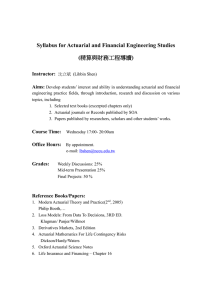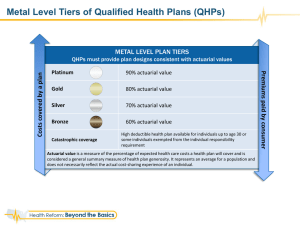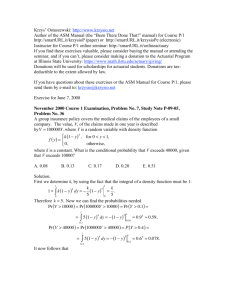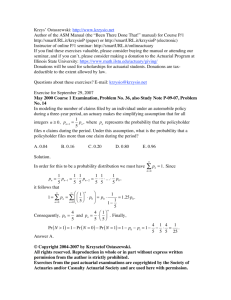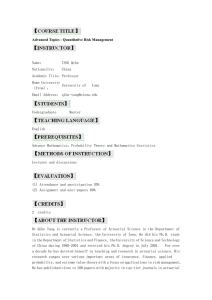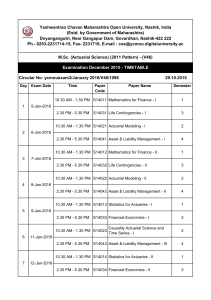RISKY BUSINESS
advertisement
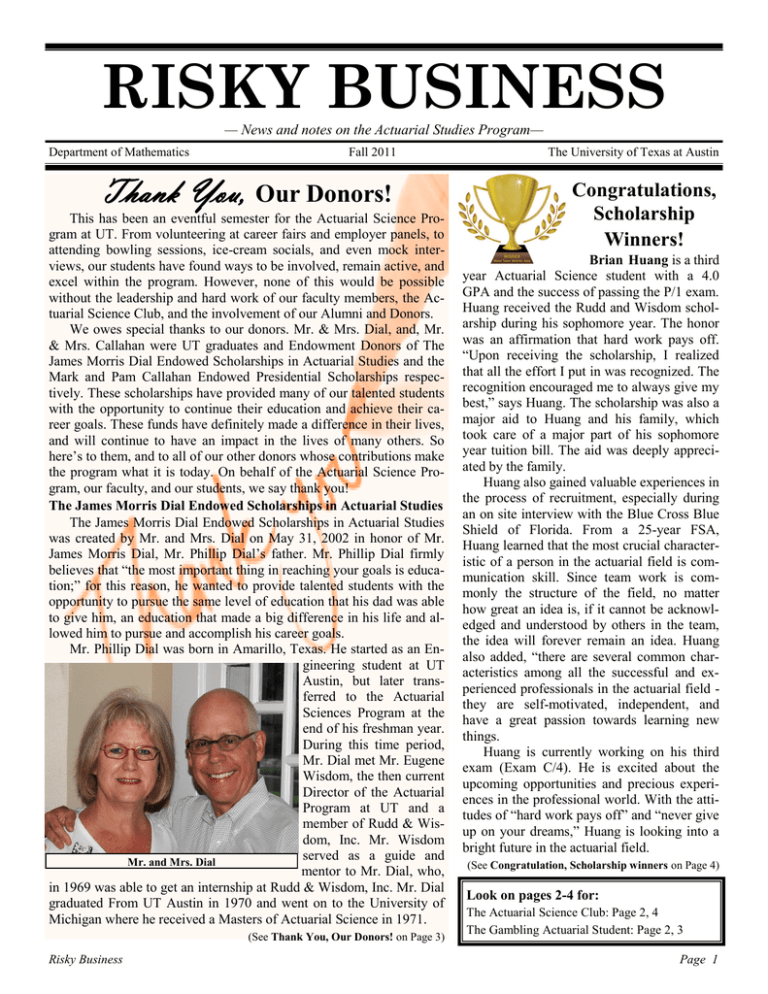
RISKY BUSINESS — News and notes on the Actuarial Studies Program— Department of Mathematics Fall 2011 Thank You, Our Donors! This has been an eventful semester for the Actuarial Science Program at UT. From volunteering at career fairs and employer panels, to attending bowling sessions, ice-cream socials, and even mock interviews, our students have found ways to be involved, remain active, and excel within the program. However, none of this would be possible without the leadership and hard work of our faculty members, the Actuarial Science Club, and the involvement of our Alumni and Donors. We owes special thanks to our donors. Mr. & Mrs. Dial, and, Mr. & Mrs. Callahan were UT graduates and Endowment Donors of The James Morris Dial Endowed Scholarships in Actuarial Studies and the Mark and Pam Callahan Endowed Presidential Scholarships respectively. These scholarships have provided many of our talented students with the opportunity to continue their education and achieve their career goals. These funds have definitely made a difference in their lives, and will continue to have an impact in the lives of many others. So here’s to them, and to all of our other donors whose contributions make the program what it is today. On behalf of the Actuarial Science Program, our faculty, and our students, we say thank you! The James Morris Dial Endowed Scholarships in Actuarial Studies The James Morris Dial Endowed Scholarships in Actuarial Studies was created by Mr. and Mrs. Dial on May 31, 2002 in honor of Mr. James Morris Dial, Mr. Phillip Dial’s father. Mr. Phillip Dial firmly believes that “the most important thing in reaching your goals is education;” for this reason, he wanted to provide talented students with the opportunity to pursue the same level of education that his dad was able to give him, an education that made a big difference in his life and allowed him to pursue and accomplish his career goals. Mr. Phillip Dial was born in Amarillo, Texas. He started as an Engineering student at UT Austin, but later transferred to the Actuarial Sciences Program at the end of his freshman year. During this time period, Mr. Dial met Mr. Eugene Wisdom, the then current Director of the Actuarial Program at UT and a member of Rudd & Wisdom, Inc. Mr. Wisdom served as a guide and Mr. and Mrs. Dial mentor to Mr. Dial, who, in 1969 was able to get an internship at Rudd & Wisdom, Inc. Mr. Dial graduated From UT Austin in 1970 and went on to the University of Michigan where he received a Masters of Actuarial Science in 1971. (See Thank You, Our Donors! on Page 3) Risky Business The University of Texas at Austin Congratulations, Scholarship Winners! Brian Huang is a third year Actuarial Science student with a 4.0 GPA and the success of passing the P/1 exam. Huang received the Rudd and Wisdom scholarship during his sophomore year. The honor was an affirmation that hard work pays off. “Upon receiving the scholarship, I realized that all the effort I put in was recognized. The recognition encouraged me to always give my best,” says Huang. The scholarship was also a major aid to Huang and his family, which took care of a major part of his sophomore year tuition bill. The aid was deeply appreciated by the family. Huang also gained valuable experiences in the process of recruitment, especially during an on site interview with the Blue Cross Blue Shield of Florida. From a 25-year FSA, Huang learned that the most crucial characteristic of a person in the actuarial field is communication skill. Since team work is commonly the structure of the field, no matter how great an idea is, if it cannot be acknowledged and understood by others in the team, the idea will forever remain an idea. Huang also added, “there are several common characteristics among all the successful and experienced professionals in the actuarial field they are self-motivated, independent, and have a great passion towards learning new things. Huang is currently working on his third exam (Exam C/4). He is excited about the upcoming opportunities and precious experiences in the professional world. With the attitudes of “hard work pays off” and “never give up on your dreams,” Huang is looking into a bright future in the actuarial field. (See Congratulation, Scholarship winners on Page 4) Look on pages 2-4 for: The Actuarial Science Club: Page 2, 4 The Gambling Actuarial Student: Page 2, 3 Page 1 This summer, I had an extraorover 30, it would approach a nordinary life experience when I was mal distribution, , so after 30 spins, diligently working at my summer my wins would be normally distribinternship with USAA as a loss uted over a negative mean and reserving analyst. I was reading a some sort of standard deviation. CAS journal when I noticed an My reasoning was that I’d stop advertisement for a seminar in Las playing when I was 3 standard deActuarial Science Is Boring? No, Look Vegas called the “Loss Reserving viations above the mean, which at Henry Zhao’s Experience! Seminar”. Having recently turned should happen 0.3% of the time. 21, I thought it would be a wonderful experience to attend I decided to search for roulette strategies online. There the seminar. I would have some fun and then learn a lot is a method explained online of betting on one color and about actuarial science. then doubling your bet if you lose. Then if you lose again, After I checked in to my fancy hotel on the Strip, I you keep doubling your bet until you win. When you win, officially began learning all I could from seminar atten- you start over at your original bet. This guarantees you dees. They all had different educational backgrounds and win the amount of your original bet every time. But after life stories to tell. After a second night of attending actu- further research, I realized that this wouldn’t work in real arial conferences, I was ready to have a cocktail, loosen life because many casinos have a maximum bet, and if you my tie, and attempt to get lucky. After playing slots for bet $1,000 and lost 5 times in a row, you may not have several hours, I was a few dollars poorer and ready for $32,000 (2^5 * 1000) to throw on the table. I thought something new. Roulette tables. Now there’s a game that these were valid points, but didn’t really think it was likely I like, because money comes and goes quickly. I sat down to lose 5 times in a row at any time, so I decided to try my at a table and within 2 hours, was $625.00 richer. luck at the Roulette table again. I found a table and deSo this is the happy ending to my Vegas story, right? cided to keep betting black until I won. To be safe, I beNot quite. I could quit at this point but I did not. Of course gan my bet at $5.00, the minimum allowed at the table. it made sense that I’d lose more and more as I played, Here are the following results from the spins beginning since with 38 numbers, 18 of which are black, my ex- with the time I joined the table: pected win per spin is negative (since guessing color cor0, 00, 0, 2, 28, 14, 2, 24, 34, 34, 10 rectly wins you your bet). I thought it would be a good I was shocked. Of course it had to be black now! idea to continuously bet one color as my winnings could (See The Gambling Actuarial Student on Page 3) be viewed as a binomial distribution. With a sample size The Gambling Actuarial Student Actuarial Science Club The main goal of the Actuarial Science Club (ASC) is to equip students in the Actuarial Science Program with necessary skills and knowledge about the actuarial profession. The ASC offers a variety of activities and resources, including Employer Panel, tutoring sessions, study groups for upcoming exams, information sessions, and social events. The club encourages stuClub Officers dents to build connections with each other and employers who are working in the actuarial field. Current club officers include Lindsay McDowell (president), Lauren Baker (vicepresident), Andrew Engel (financial director), Emily Kunkel (administrative), and Serita Smith (events coordinator). The Employer Panel is a brand new activity started by the ASC during the 2011 fall semester. The Club had the Risky Business pleasure to invite nine employers from both insurance and consulting companies. The Panel provided a great opportunity for students to raise questions related to the recruiting process, as well as any questions regarding the actuarial field. The Panel also helped the employers to have a better understanding of the actuarial sciences students’ background and skill sets. Students asked a variety of questions about entry-level jobs and career development within different companies. Some of the questions showed that students did detailed research about specific companies and their understanding about actuarial work, which deeply impressed the employers. The Employer Panel has received great feedback from both the employers and the club members. Students have found this event especially helpful as it provided another chance for them to absorb important information and knowledge about the actuarial profession while also gained exposure to the employers. The Panel is a success that strongly supports both new and experienced students in the Actuarial Science Program, and the ASC will continue holding this event in the future. The ASC organized an unofficial group tutoring session to help students who are taking the Interest Theory class. Seniors who took the class before or have successfully passed the Exam FM/2 volunteered to tutor the session. (See ASC on Page 3) Page 2 Thank You, Our Donors!, Continued He then returned to Rudd & Wisdom, Inc. in June of the same year, and in 1975, became a Senior Principal there. Rudd & Wisdom, Inc. is an actuarial professional services firm located in Austin, Texas. Mr. Dial works in the design and financial planning of health, welfare plans, and work benefit programs. He mainly does work and analysis for governmental entities and other clients. For him, one of the most rewarding things about being an actuary is the ability to have a direct impact in the lives of many people through his work and area of expertise in programs such as: Social Security, Medicare, and Medicaid. The James Morris Dial Endowed Scholarships in Actuarial Studies has given many students the opportunity to pursue the kind of education that Mr. Phillip Dial’s father was able to provide him. It truly makes a difference in their lives and the lives of many others, and it will continue to do so for many years. The Mark and Pam Callahan Endowed Presidential Scholarship in Actuarial studies The Mark and Pam Callahan Endowed Presidential Scholarship in Actuarial studies was established on June 14, 2010 by Mr. Mark & Mrs. Pam Callahan, both UT graduates from the McCombs School of Business. For Mr. and Mrs. Callahan, one of the most rewarding things about their undergraduate education was the fact that UT was able to provide both of them with great academic and life opportunities, opportunities which helped them grow as professionals and as persons. Mr. Callahan was a member of the Sigma Chi Fraternity, the Rugby team, the Texas Cowboys, and President of the Actuarial Science Club. His Wife, Mrs. Pam Callahan, was a member of the Alpha Chi Omega Sorority, and The Texas Cowgirls. All of these activities and involvement allowed the Callahans to have a very enjoyable College experience. Knowing that none of these things would have been possible without the scholarships they received, Mr. and Mrs. Callahan decided to provide funds for our students so that they could enjoy the same educational and social opportunities that UT offered them. Mr. and Mrs. Callahan both earned BBA’s in Accounting in 1992 from UT. Mrs. Callahan passed her first two Actuarial exams, but later decided to earn her CPA. Mr. Callahan, on the other hand, continued in the Actuarial Path later becoming a Fellow of the Casualty Actuarial Society. Mr. Callahan worked at XL Insurance for 12 years where he became Chief Risk, Underwriting, and Actuarial Services Officer. He now works at HCC Insurance Holdings, Inc. a leading international specialty insurance group headquartered in Houston, Texas, where he serves as Executive Vice President. For him, the most rewarding thing about being an actuary is that it gives him the opportunity to solve complex problems on a day to day basis. “It is both challenging and rewarding,” he remarked, to able to help “businesses identify risk and become more efficient.” The Mark and Pam Callahan Endowed Presidential Scholarship in Actuarial studies will continue to support many of our talented students in achieving their educational goals, giving them a chance to acquire a good education and enjoy their time at UT. (By Keith Cruz) Actuarial Science Club, Continued At the same time, the tutoring session provides a great chance for students to improve their communication skills by explaining the actuarial terminologies and concepts to each other. Besides the TA session, the ASC also hosts exam preparation sessions on an irregular basis to help the students prepare for their SOA upcoming exams. In addition, the Actuarial Science Club has held a series of company information sessions. These sessions have provided a great platform for actuarial students to learn the focuses and core values of different companies. The interactions among students and recruiters has enabled our students to ask more questions outside of the interview settings while also allowed employers to know about their candidates better. Companies are becoming increasingly creative in terms of how they present their organizations to potential job and internship candidates. When AAA held their information session, they introduced a very interesting insurance subject related pricing competition. This novel attempt successfully grasped students’ attention and impressed the clubs for helping students learn something about pricing besides having fun during the club meeting. Mercer held a bowling event, which was appealing to students who wanted both fun and networking opportunity. A student was invited to an interview during this social event, and the club saw this as a solid proof that these events could greatly benefit UT actuarial students. The Actuarial Science Club strongly encourages students to put time and effort into building personal network, such as attending social events or any casual actuarial forums. The club recognized that it is important to network with the recruiters and experienced actuaries since they can provide valuable insights about their field and work. At the same time, it is also helpful to for actuarial students to network with Mercer Bowling Events their peers in their classes and the club – students may have unique understanding about the profession through internship experience, and they are the ones who will grow into actuarial professionals in the future! Risky Business (Special thanks to Mr. and Mrs. Dial and Mr. and Mrs. Callahan) (By Johanna Shiau, Chuying Huang) Page 3 The Gambling Actuarial Student, continued I looked at the black betting area, and virtually every Roulette player had stacks upon stacks of chips on black. My brain screamed “stop! Each spins is probabilistically independent, meaning there is still an 18/38 chance it will be black” but my devil retaliated, saying “come on, Henry, how likely do you think there is 9 reds in a row following 3 greens in a row!?” I had $100 in chips left and threw it all on black. The dealer spun the wheel; the wheel spun fast and my heart beat even faster. 12 My jaw dropped. I returned to my room and began to think about why I had lost. I opened Excel to create a Roulette simulation. I wanted to test out my strategy by running random simulations, which I recently learned in my Statistics and Modeling course. I made several columns, including “bet amount”, “result of spin and “winnings”. The spin result was done first with the formula =INT(2*RAND())+INT(RAND()+1/9). This gave a 18/38th chance of being 0 (which I denoted black), 9/19th chance of being 1 (which I denoted red and 2/38th chance of being 2 (which would be green). The bet amount was then started at 1, in the 1st row and 1st column. I decided to bet black the entire time, and so the subsequent rows were done with the formula =IF(A2=0,1,A1*2). This was if the result was black, I’d go back to betting $1, and if the result wasn’t, I’d have to double my bet. The winnings column was done similarly, with the formula =IF(A2=0,A1,-A1). I would then have to sum up the 3rd column to find out the final result. I copied and pasted the columns 200 times and then hit recalculate many times to watch the value for =SUM(C1:C200), which was my total winnings. Surprisingly, the odds seemed pretty good. Most of the time, I left the winner, and my winnings were around $70-100. So I’d just have to play about 200 times to win $100. Right? Wrong. After thinking about it, I realized that I was mistaken in leaving out the minimum and maximum bets Congratulations, Scholarship Winners!, Continued James Goode is a student at the University of Texas in Austin. He will be graduating in December 2011 with a degree in Actuarial Science. Before entering college, he was, as are most college students, conflicted about what field to pursue but his grandmother eased that transition by finding him the perfect fitting career. She had a habit of going through newspapers and happened to come across the top notched reputation of an actuary. Then noting that James had a passion for math she convinced James to look into it. He was hesitant to commit before knowing what he was getting himself into but after hours of research he knew that it was what he wanted. After hours of dedication to the subject and time spent studying for the exams. His advice for Risky Business at the table. The biggest range I could find at any roulette table was from $5 to $3000. I made the necessary changes in my spreadsheet by changing my starting bet to 5. I then included the “if” qualifier that =IF(A1=2560,5,IF(A2=0,1,A1*2)). This was if I started at $5 again every time I exceeded the limit. $2560 was chosen for the limiting value because a loss after that bet would exceed the limit since 2560*2 = 5120. As I kept pressing F9 to rerun the simulation, I noticed that almost every time I was losing! Most of the time I seemed to lose between $200 and $400! There were even times I lost over $2000. Almost every time, I passed the limit within 200 trials, which makes sense since it only takes 10 red/green streaks to pass $2560. That happened to me at the table. Everything made sense now! In conclusion, I learned many things from this experience. First, it was an excellent way to apply everything I learned in class, and even maybe challenge certain assumptions. Also, I learned that sometimes an initial analysis is not the whole truth; it takes a complete analysis to uncover the real mathematical truth in a situation. Finally, I had a great time and learned to be wiser in Vegas. You may be wondering now whether or not the trip was a happy ending. What actually happened was that the next day I was still very sad that I had lost $2000, so I withdrew $1000 from a bank branch. I seriously considered betting it all on black to win back some of my losses, but it was so risky! I walked around New York with my $1000 in an envelope and looked at all of the roulette tables. I then saw one with the following spin history. 11 29 3 1 0 00 0 17 27 11 27 9 I thought to myself, “I’ve seen this before!” However, I decided to bet on red this time, knowing it was all probabilistically independent. “I’ll have $1000 in chips please”, I told the dealer. I then decide to insure myself a bit and put $950 in chips on red. “Wow, you want to win fast, don’t you?” the dealer asked. I crossed my fingers and nodded. The dealer spun the wheel. 24 (By Henry Zhao) those preparing for an exam is to use the ASM Manuals and utilize the classes available. His hard work paid off and earned him an internship with Texas Mutual and then later on TransAmerica in Sydney, Australia. While he dealt with life insurance he grew even fonder of the career option, so much so, that he accepted to work with TransAmerica after graduation in Bedford. As a result of his accomplishments, he earned a TransAmerica Life Insurance scholarship. The funds have not yet been disbursed to him but he was greatly relieved to have received the scholarship. The money will go towards alleviating a portion of the loans that he has acquired and will aid him on his way to becoming a successful employee. (By Johanna Shiau, Sara Zaman) Page 4 UNIVERSITY OF TEXAS AT AUSTIN ACTUARIAL SCHOLARSHIPS 2010 – 2011 Administered by Dr. Leslie Vaaler, Buck Consultants Associate Director of Actuarial Studies James Morris Dial Scholarships in Actuarial Studies Kevin Ma Taylor Triggs Myron “Butch” Dye Memorial Actuarial Scholarships Ruoshu Chen Xiaomeng Jiang Sanchi Srivastava Caleb Tam Bruce Fuller Endowed Presidential Scholarship in Actuarial Studies Daniel Marts Mark and Ashley Guajardo Actuarial Scholarship Taylor Triggs Xile Xu George R. Jordan Jr. Actuarial Scholarships funded by the Actuarial Club of the Southwest Ruoshu Chen Yu-Hsing Chen Benjamin Smith Taylor Triggs Xiaojie Wang Yi Zhang George R. Jordan Jr. Actuarial Scholarships funded by Retirement Horizons Incorporated Wen Bao Xiaojie Wang George R. Jordan Jr. Actuarial Scholarships funded by the Southwest Actuarial Forum Ruoshu Chen Joshua Lambert Sizhe Liu Harvey Powers Mercer Actuarial Scholarship Jacob Sullivan Milliman Standard of Excellence Actuarial Scholarship David Hough New Era Insurance Company Actuarial Scholarship Joshua Lambert Benjamin Smith John S. Rudd Jr. Scholarships in Actuarial Studies Sizhe Liu Harvey Powers Risky Business Rudd and Wisdom Actuarial Studies Scholarships Ruoshu Chen Brian Huang Alex Lee Daniel Marts Joe Ojile Aeron Riordin Jacob Sullivan Ruoan Wang Wenjing Zhan D. W. Simpson & Co. Scholarship Lindsay McDowell Swiss RE Actuarial Scholarship Wenjing Zhan Towers Watson Actuarial Scholarships Michael Daehne Xiaomeng Jiang Lindsay McDowell Stephen Nyamapfumba Janie Shaw Katherina Tjin Transamerica Life Insurance (a brand of Aegon) Actuarial Scholarships Dalesa Bady Justin Belle Aeron Riordin Troncoso Consulting Group Actuarial Scholarship Ruoan Wang USAA Life Actuarial Scholarship Wenjing Zhan Katherina Tjin Yi Zhang USAA P&C Actuarial Scholarships David Hough Taylor Triggs Eugene Wisdom Memorial Scholarship Yu-Hsing Chen Michelle Gregory Editor: Ruoshu Chen Contributor: Johanna Shiau, Keith Cruz, Henry Zhao, Chuying Huang, Sara Zaman, Jack Liu Special Thanks to Dr. Mark Maxwell, Dr. Leslie Vaaler, Mr. Brian Levine, Actuarial Studies Advisory Council Page 5
